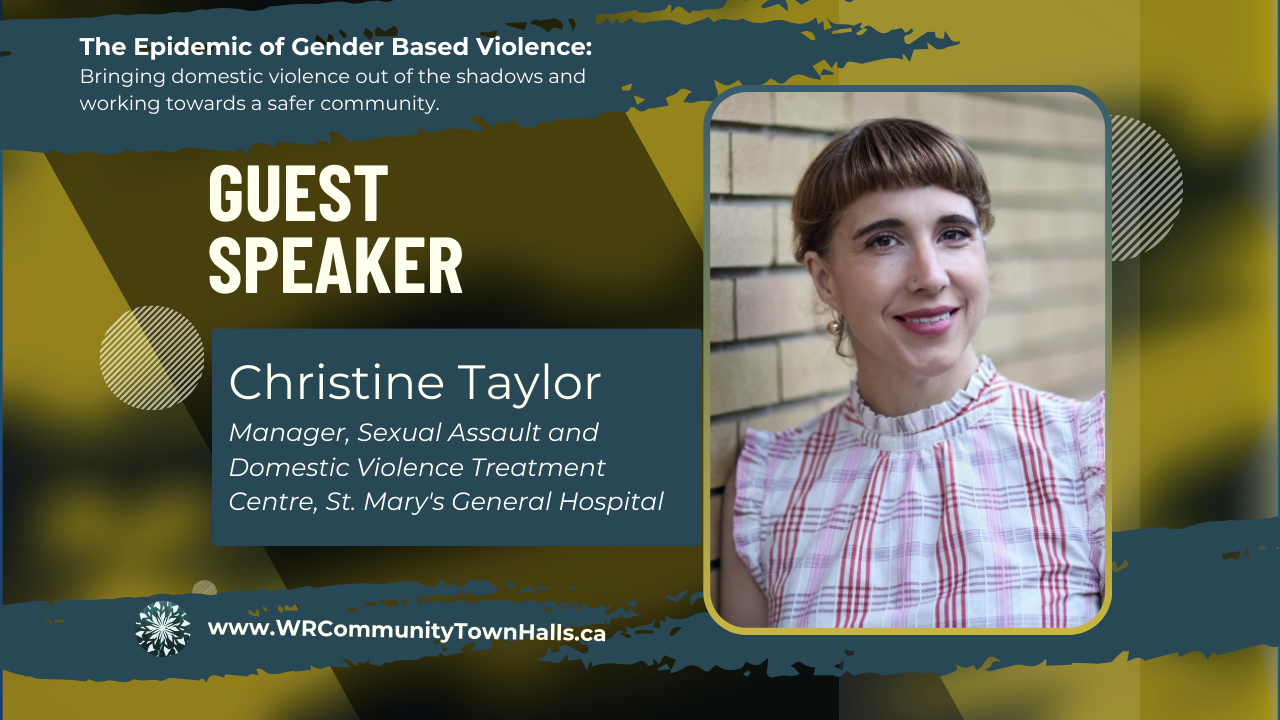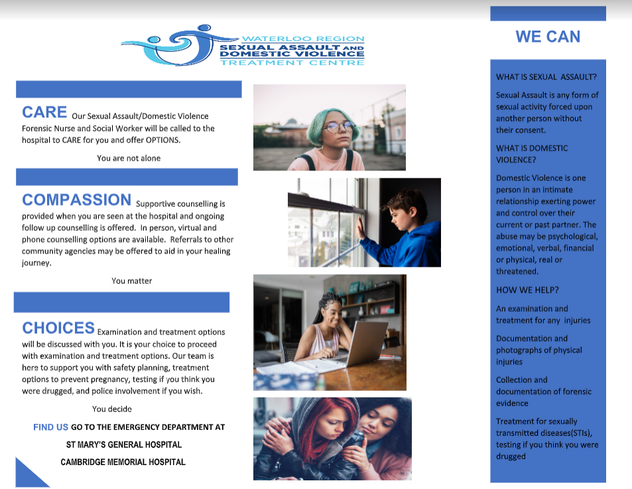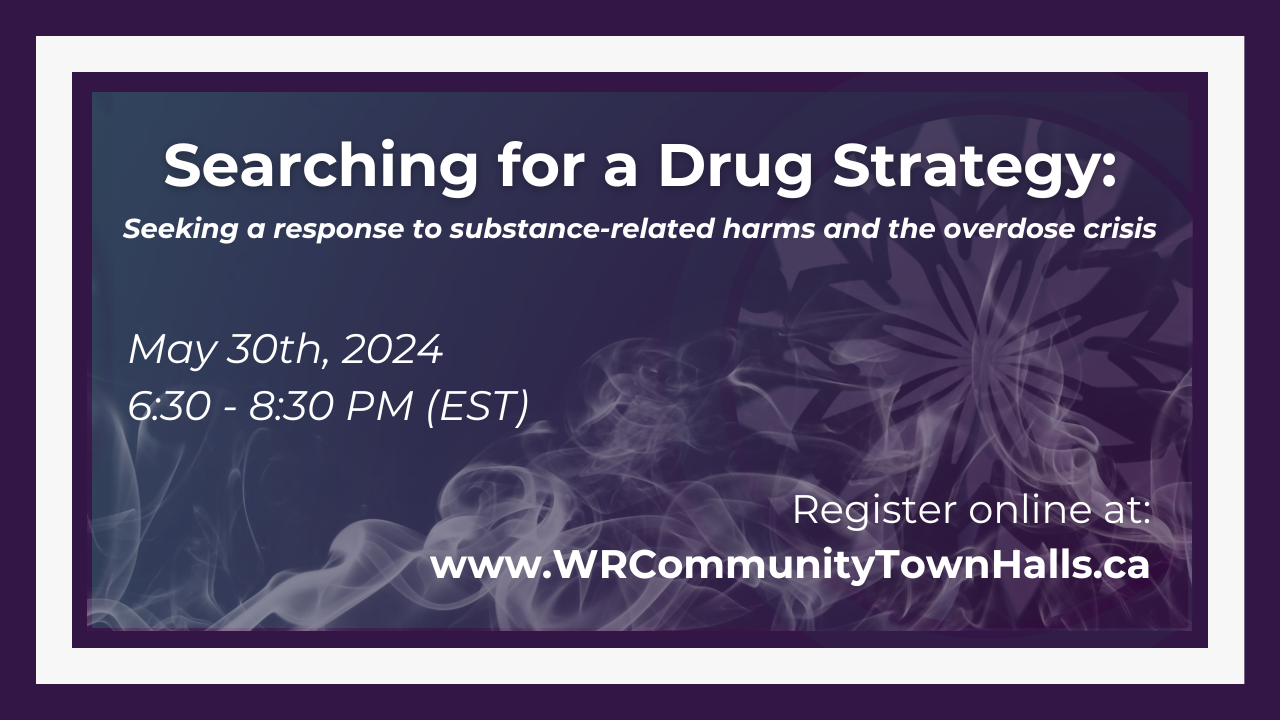|
|
The Epidemic of
|
|
Christine Taylor is a Registered Social Worker with a Master of Social Work from Wilfrid Laurier University. She has worked on the front-lines with victims of intimate partner violence for 13 years and is currently the Program Manager of the Sexual Assault and Domestic Violence Treatment Centre of Waterloo Region at St. Mary's Hospital.
Prior to this, Christine was engaged in gender-based violence work in West Africa. Christine is also a member of the clinical panel with the Office of the Children’s Lawyer (The Ministry of the Attorney General of Ontario). |
Sexual Assault and Domestic Violence Treatment - St. Mary's General Hospital
|
How to access services:
(Below information sourced from St Mary's General Hospital page here) "Come to the Emergency Department of St. Mary’s General Hospital or Cambridge Memorial Hospital. The team will be contacted to meet with you in private. For any other questions or concerns, or to arrange counselling please call our office at (519) 749-6994. If you are in immediate danger or crisis now, please call 911. |
Presentation
|
|
The Escalating Crisis of IPV: Christine Taylor
- Rising Severity and Frequency of IPV Cases: In 2023, there is a significant increase in serious injuries related to intimate partner violence (IPV), including cases of strangulation, sexual exploitation, and assault with a weapon. This is a marked change from 15-20 years ago when such severe cases were rare.
- Public Health Crisis: IPV has evolved into a public health crisis, with victims suffering long-term, debilitating injuries such as stroke, amputation, and facial disfigurement. This severity reflects the escalating intensity of IPV cases.
- Youth and Online IPV Dynamics: There's an alarming trend of IPV among youth, starting as young as 13 years old. Modern IPV dynamics involve online harassment, stalking, and sexual exploitation, making it crucial to engage and educate youth on these issues.
- Comprehensive Support System: The Saint Mary's Hospital team, part of the Family Violence Project, offers a comprehensive approach to IPV, including medical, forensic, and counselling services, emphasizing the importance of community-based support and intervention.
- Challenges in Exiting Abusive Relationships: Exiting an abusive relationship is complex and multi-staged, often involving continued IPV issues post-separation, especially in cases with children. This highlights the need for ongoing support and intervention.
Christine Taylor, in her presentation, introduces the work of the sexual assault domestic violence team at Saint Mary's and Cambridge Hospital. She outlines their comprehensive approach, encompassing a 24/7 response team consisting of nurses and social workers. They provide a range of services, including crisis support, medical treatment, forensic evidence collection, and follow-up counselling, making them unique in Ontario for having both a social worker and nurse present for emergency cases.
Taylor highlights a disturbing trend observed since the COVID-19 pandemic: a significant increase in severe cases of intimate partner violence. Contrary to the common misconception that intimate partner violence is a minor, behind-closed-doors issue, she explains that they are now routinely encountering victims with serious, life-threatening injuries. These include cases of forced confinement, strangulation, sexual exploitation, and assaults with weapons. Such severe cases, once rare, have become increasingly common, indicating a shift towards more violent instances of intimate partner violence.
A critical aspect of Taylor's address is the focus on intimate partner violence as a public health crisis. She provides harrowing examples of the types of injuries they are seeing, including strokes from strangulation and amputations due to delayed medical care. These examples underscore the severe and long-lasting impact of such violence on victims' health. She stresses that this trend is not isolated to the Waterloo Region but is a province-wide issue, as confirmed by her interactions with managers of similar teams across Ontario.
Another significant point of Taylor's presentation is the emphasis on youth and intimate partner violence. She notes the alarming age at which victims are presenting to hospitals, some as young as 13 or 14. These young individuals face a complex array of challenges, including online harassment, stalking, and sexual exploitation. Taylor's remarks underscore the urgent need for early intervention and education about intimate partner violence among youth. She advocates for engaging youth in conversations about this issue and incorporating them into the movement against intimate partner violence.
Taylor also speaks about the complexities involved in assisting victims of intimate partner violence. She acknowledges the difficulties victims face in deciding to leave abusive relationships, dealing with post-separation violence, and navigating legal constraints like no-contact orders. She highlights the multifaceted nature of the support required, including the need for mental and emotional health support for survivors.
Additionally, Taylor mentions the Family Violence Project, which facilitates collaboration among various services dealing with intimate partner violence. This project allows for a coordinated, multi-disciplinary approach to supporting victims, emphasising the importance of integrated service delivery.
In conclusion, Taylor's address paints a comprehensive picture of the current state of intimate partner violence, emphasizing its severity and the critical need for a coordinated, multi-faceted response. Her focus on the alarming trends in youth violence and the public health implications of such violence underscores the urgency of addressing this issue at various levels, from individual support to broader societal engagement and policy initiatives.



